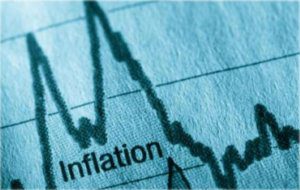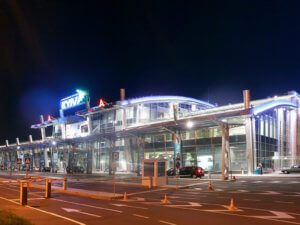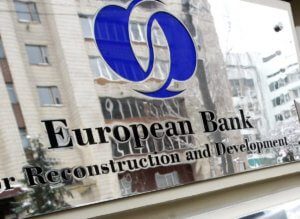
The growth of consumer prices in Ukraine in February 2018 was 0.9% compared to 1.5% in January, the State Statistics Service of Ukraine has reported.
According to the agency, in annual terms (February 2018 to February 2017) the growth of consumer prices slowed down to 14% from 14.1% compared to January 2018 from January 2017.

The primary registration of electric vehicles in Ukraine (new and used) in January-February of this year increased by 60% compared to the same period last year, to 482 units, in particular registration of used cars rose by 82%, while that of new ones decreased by 19%, the Ukrautoprom association has reported.
Traditionally, the leader of the primary market of electric cars in the two months was Nissan Leaf, whose sales increased by 32%, to 346 units, with the share of used cars standing at 96%.
BMW i3 ranked second with a significant margin (by 316 units) with 30 registered cars (six times more), including 18 used vehicles.
Tesla Model S ranked third among the top three most popular electric cars in the Ukrainian market with 20 cars registered, including 14 used vehicles.
The association notes that in January-February there were models of electric cars in the market that replenished the Ukrainian fleet with exclusively new cars, namely Hyundai Ioniq (7 cars), Tesla Model X (4 cars), and Chevrolet Volt (2 cars).

The Kyiv international airport (Zhuliany) serviced 130,800 passengers in February 2018, which is 51.6% more than in February 2017, the airport’s press service has reported.
The press service said that the number of passengers on international flights was 124,900 and on domestic flights – 5,900.
The number of flights in February 2018 was 1,648, which is 20.5% more than a year ago, including 1,356 international flights and 292 domestic flights.
The most popular international destinations in February-2018 remained similar to January: Dubai (the UAE), Minsk (Belarus), Ankara (Turkey), Budapest (Hungary), Warsaw (Poland), Memmingen (Germany), Rome (Italy); and domestic – Odesa, Zaporizhia and Lviv.

The European Investment Bank (EIB) and the Eastern Europe Energy Efficiency and Environmental Partnership E5P have signed two donor agreements totaling EUR 16.4 million to support higher education and municipal infrastructure in Ukraine.
“This assistance will be used to upgrade educational institutions. The facades [of their buildings], ventilation, heating and lighting systems will be modernized … The second agreement concerns the heating system in Kryvy Rih: meters will be installed at the consumers’ level,” EIB Vice President Vazil Hudak said at an official event to sign the agreements in Kyiv on Wednesday.
Under the project, EUR 10 million will be spent on measures to improve energy efficiency in seven universities in Ukraine, and EUR 6.4 million will be allocated for upgrading Kryvy Rih’s heating supply systems.
E5P is a multi-donor fund supporting municipal investments in energy efficiency and environmental projects in the Eastern Partnership countries, namely Armenia, Belarus, Georgia, Moldova, and Ukraine.

The big three of Ukrainian mobile operators predicts that the 4G communications technology for the 1800 MHz band could be launched in July 2018, representatives of all three mobile operators told reporters after an auction held on Tuesday.
CEO of mobile operator lifecell Ismet Yazici said that his operator is ready to launch 4G communications in July, as soon as conversion of radio frequencies is finished.
“We will launch in the 1800 MHz band in July. Nobody has the right to launch it until July. Everyone should start simultaneously. Now it will be a frequency exchange. This is a difficult and complicated operation. I’m not even sure that Ukraine had precedents of such a grand exchange frequencies,” Kyivstar President Peter Chernyshov said.
He said that from the point of view of infrastructure, Kyivstar has everything ready to launch 4G in the1800 MHz frequency band.
CEO of Vodafone Ukraine Olha Ustinova also said that the network of her operator is ready for the launch of 4G communication.
“I predict that in the 2600 MHz band we will launch it at the end of March, if nothing happens. In the 1800 MHz band – early July,” she said.
Previously, all operators had forecasted that 4G communications would be launched late March or early April.

Ukrainian pharmaceutical manufacturers must undergo prequalification of the WHO (World Health Organization) to participate in international tenders, United Nations Development Programme (UNDP) Country Director in Ukraine Janthomas Hiemstra has said.
“Ukrainian companies will have to compete at the international level. Now Ukrainian companies will have to upgrade their standards to international standards, which means they can compete not only at our standards, they can compete internationally. They can start exporting. That’s, actually, very good news for Ukrainian companies – to live up to international standards and start producing for the rest of the world as well,” he said in an interview with Interfax-Ukraine.
Hiemstra noted that in tenders held by international organizations, in particular, UNDP, “Ukrainian producers have to compete at the international level as well.”
Some foreign medicines are cheaper than Ukrainian ones, but in this case international confirmation of quality is very important. In the world, the standards of the World Health Organization (the so-called prequalification) have been developed, but Ukrainian producers have not been able yet to adopt these standards, he said.
“For the last 20-30 years Ukrainian pharmaceutical companies were mostly producing for Ukraine. So they didn’t have to live up to international standards,” he added.